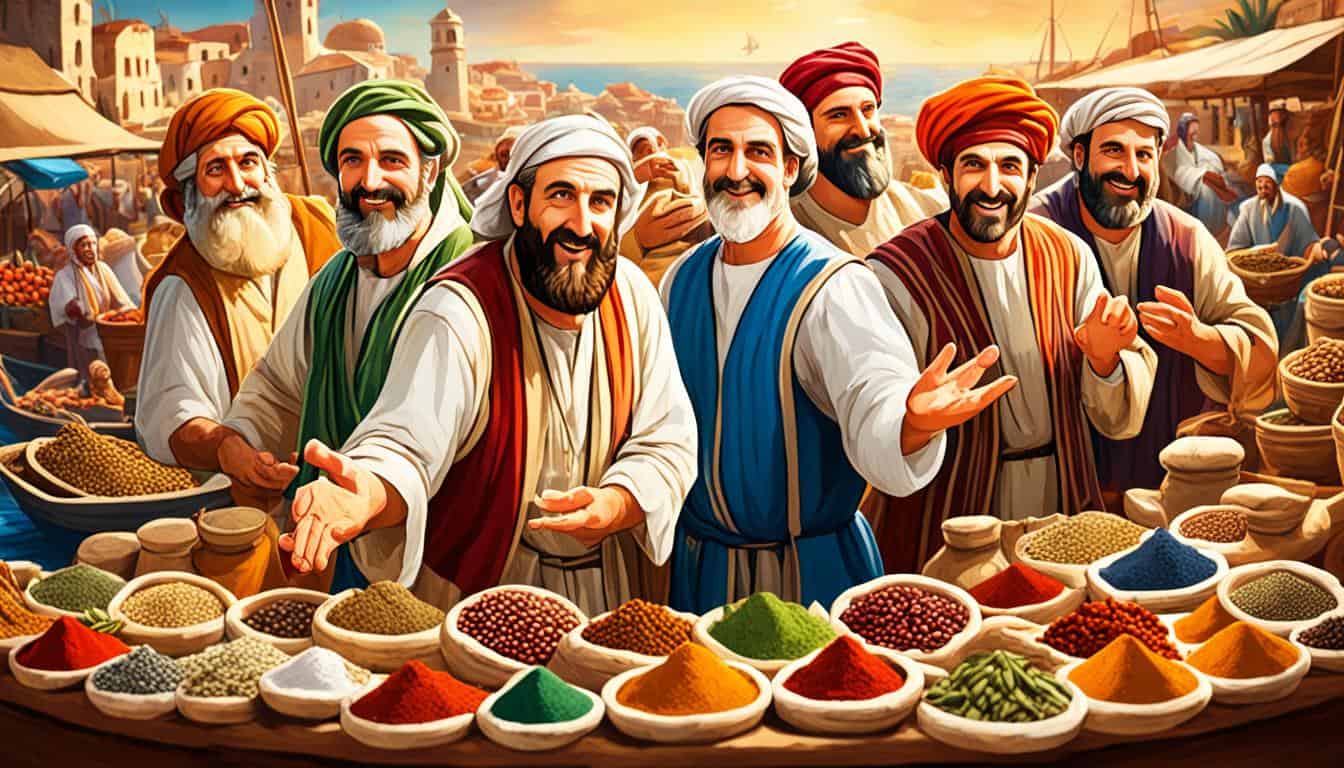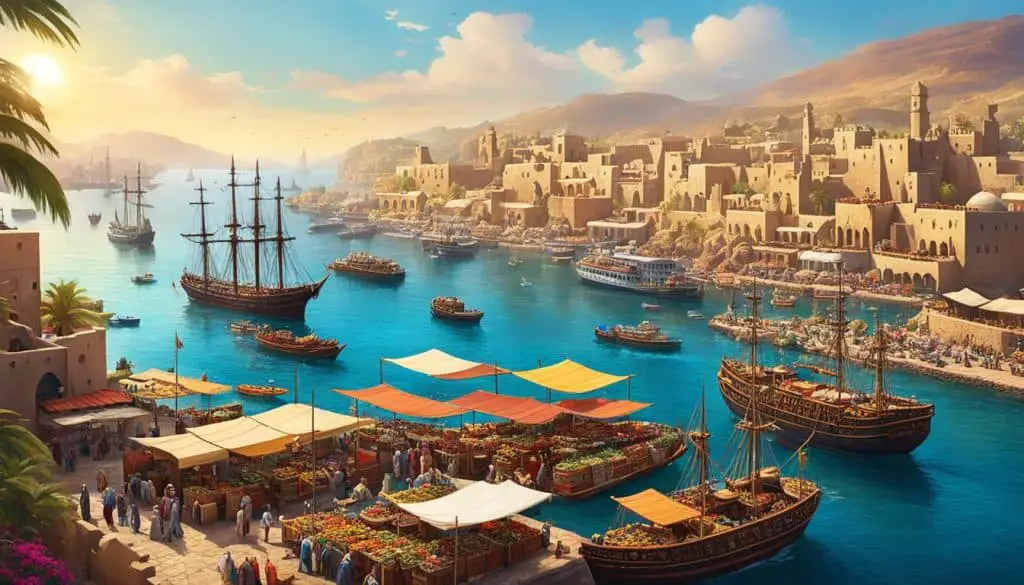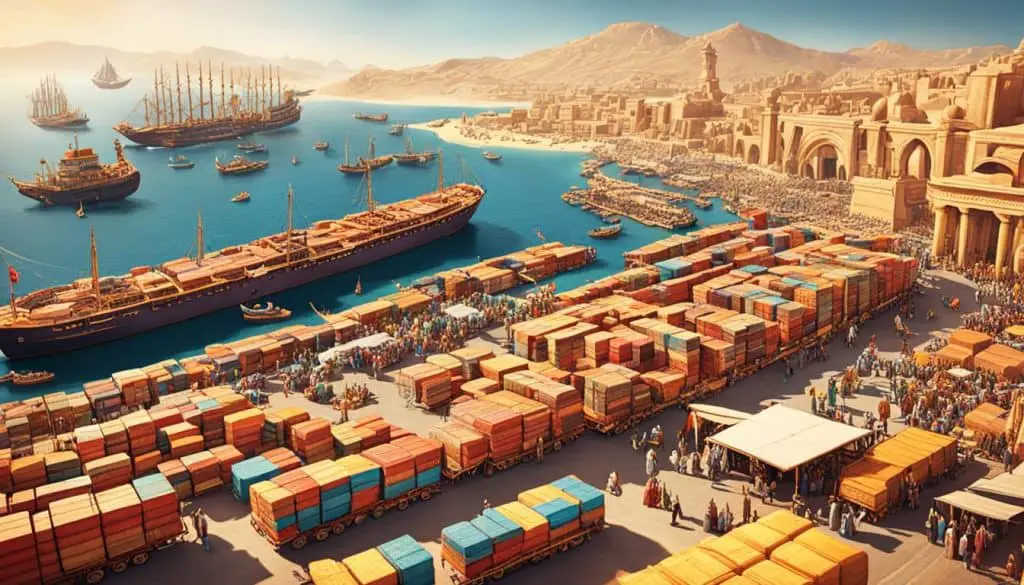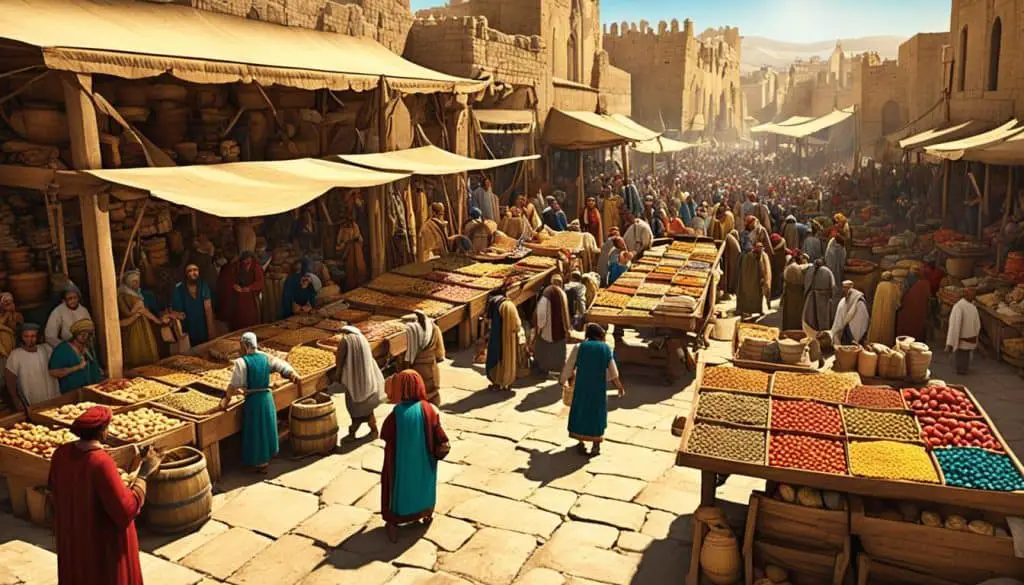Table of Contents
When we talk about spirituality, we often picture quiet temples and devoted people. But, the Bible also shows us how Merchants and Traders had a big impact. They influenced both ancient commerce and spirituality itself.
This article is a journey through the past. We’ll look at the stories of 10 key people who were powerful traders. You’ll hear about Abraham’s trade to Egypt and the Spice Merchants in the Apocalypse. Each story shows the deep connection between wealth and spiritual meaning.
Imagine wearing an explorer’s hat and finding where trading and faith meet. Are you excited to find the secrets of Merchants and Traders in the Bible? Let’s get started!
Abraham’s Trade Journey to Egypt
In Genesis 12:10-20, we learn about Abraham’s trip to Egypt during a bad famine. This story shows how smart Abraham was in trading and finding food despite the hard times in Canaan.
Abraham and Sarah left their home to go to Egypt for food. They faced many challenges. But Abraham’s skill in trading helped them get what they needed in a place where food was scarce.
Abraham used his knowledge of trade and sharp negotiating skills to his advantage. This shows how clever and determined he was. Trading was vital for survival then. Abraham knew how to make the most of it.
“Now there was a famine in the land, and Abram went down to Egypt to sojourn there, for the famine was severe in the land… And when the Egyptians saw her, they said, ‘This is his wife. Then Pharaoh gave men orders concerning him, and they sent him away with his wife and all that he had.”
– Genesis 12:10, 12:19
This tale describes Abraham’s bravery and his ability to solve problems. It also shows how important trading was back then. His journey to Egypt teaches us about the value of trade routes and the strategy of bartering for food.
The Ishmaelite Traders Who Bought Joseph
The story of Joseph in the book of Genesis is very captivating. In this story, we meet the Ishmaelite traders who have a big part in Joseph’s life. These traders were part of a big group of merchants and traders. They traveled through ancient lands, moving goods all around.
Joseph’s brothers were very jealous and wanted to harm him. One day, they saw these Ishmaelite traders and sold Joseph to them. This act led Joseph to Egypt, where he eventually became a powerful leader.
The story highlights the active trade during that time. The Ishmaelite traders were from Ishmael’s descendants. They were known for their trade work, including dealing in slaves. They traveled long distances, facing tough conditions, to trade and make a living.
“And they sat down to eat bread, and they lifted up their eyes and looked, and behold, a caravan of Ishmaelites came from Gilead, with their camels bearing gum, balm, and myrrh, on their way to carry it down to Egypt. Then Judah said to his brothers, ‘What profit is it if we kill our brother and conceal his blood? Come, let us sell him to the Ishmaelites, and let not our hand be upon him, for he is our brother, our own flesh.’ And his brothers listened to him. Then Midianite traders passed by. And they drew Joseph up and lifted him out of the pit, and sold him to the Ishmaelites for twenty shekels of silver. They took Joseph to Egypt.” – Genesis 37:25-28
This short look at the Ishmaelite traders reveals a lot about ancient civilizations. Trade caravans like theirs were key in exchanging goods, ideas, and even people. They played a huge role in the economy and society of the time, affecting history greatly.
The Role of Trade Caravans in Ancient Commerce
The Ishmaelite traders belonged to a broad network of trade caravans. These caravans connected huge parts of the ancient world. They carried important goods like spices, textiles, and metals.
Traveling in caravans was safer and more efficient. It protected them from dangers and helped them move goods easily. Caravans made it possible to trade over long distances and share different cultures.
Trade caravans were crucial for many people, providing goods and boosting economies. They built big networks that spread across lands, opening up the flow of goods and ideas. These networks set the foundation for the famous trading routes that later shaped history.
In the Bible, many stories talk about the importance of trade caravans. From Abraham and Joseph’s journeys to the well-known Spice Route, these stories show the busy trading life and its connections.
Stay tuned to learn more about the fascinating tales of merchants and traders in the Bible. Discover how they influenced ancient trade and spiritual beliefs.
Section Biblical Reference Key Theme Section 1 10 Examples of Merchants and Traders in the Bible Section 2 Abraham’s Trade Journey to Egypt Section 3 The Ishmaelite Traders Who Bought Joseph Influence of trade caravans Section 4 The Prominence of Phoenician Merchants Section 5 The Powerful Merchant Queen, the Queen of Sheba Section 6 Job’s Wealth from Trading Ventures Section 7 The Resourceful Wife of Proverbs Section 8 Nehemiah and the Emergence of the Merchant Class in Judah Section 9 The Damascus Merchants – Trade in Wine and Wool Section 10 The Symbolism of the Spice Merchants of the Apocalypse Section 11 The Parable of the Unjust Steward and Potential Manipulation in the Merchant Class Section 12 Exploring the Influence of Merchants and Traders in the Bible The Prominence of Phoenician Merchants
In the Bible, Phoenician merchants played a big part in sea trade. We see this in 1 Kings 9:10-14, showing the bond between two powerful kings. King Hiram of Tyre and King Solomon worked closely together.
“At the end of twenty years, Solomon finished building the two important houses. He gave Hiram twenty cities in Galilee. When Hiram saw these cities from Tyre, he was not happy and asked, ‘Why did you give me these cities, my friend?’ So, these lands are known as Cabul. But Hiram also sent the king 120 talents of gold.”
This text reveals the important trade ties between the two kings. King Hiram, being a Phoenician merchant, sent workers and materials. They helped King Solomon build the temple.
This partnership shows the skill of Phoenician traders in moving goods by sea. Their part in building the temple shows their wealth and influence.
Phoenician merchants made a big name for themselves in the ancient world of trade. Their vast connections and navigation skills were crucial. They significantly grew trade and shared different cultures and knowledge.
Traders and merchants in the Bible were key to many stories. We must remember the Phoenician merchants’ big impact on sea trade. They changed the economy and culture of many ancient nations.
The Powerful Merchant Queen, the Queen of Sheba
In the bible, 1 Kings 10:1-13 tells us about the Queen of Sheba. She was a woman of immense wealth and power. She traveled far to meet King Solomon, bringing rich gifts from her prosperous land.
Visiting King Solomon, the Queen proved she was a powerful merchant queen. She journeyed through dangerous lands to discuss trade and diplomacy. This showed her influence and skill in international affairs.
“And when the Queen of Sheba heard of the fame of Solomon concerning the name of the Lord, she came to prove him with hard questions.”
She gave gold, spices, and precious stones to King Solomon from her wealthy kingdom. These gifts represented her kingdom’s prosperity and knowledge of trade. Such commodities were highly valued back then, showing her wealth and wisdom.
The meeting between the Queen and King was about more than just exchanging gifts. They shared knowledge and wisdom, enriching each other. This marked the beginning of a cultural and commercial connection between their lands.
The Queen’s journey and her meeting with King Solomon were historic. They highlight the crucial role of women in ancient trade. Her visit showed how powerful merchant queens influenced the ancient world through their trade.
Exploring the stories of merchants in the Bible lets us see their amazing tales. These stories show the big effect they had on trade and faith long ago.
Job’s Wealth from Trading Ventures
In the book of Job, you find a story about a man from the East, among the greatest of his time. He became very rich from trading ventures (Job 1:3). This highlights the key role trade played in ancient societies.
Job was known as the most important man in the East because of his many achievements and influence. The wealth he gained through trading made him a respected person in society. It showed how success in trade brought him power and wealth.
“And he had seven sons and three daughters, and his possessions were seven thousand sheep, three thousand camels, five hundred yoke of oxen, five hundred female donkeys, and very many servants; so that this man was the greatest of all the people of the East.” – Job 1:2-3
Job’s trading success brought him great herds of animals like sheep and camels. These animals were seen as a sign of wealth. He also had many servants, showing he was at the top of society.
The tale of Job highlights how important trade was back then. It shows how becoming a successful trader could lead to wealth and influence. This story shows the crucial role traders had in ancient East’s economy.
Job’s Wealth Quantity Sheep 7,000 Camels 3,000 Oxen (yoke) 500 Female Donkeys 500 Job’s riches came from his successful trading endeavors. His story in the Bible offers guidance for those entering business. It shows the impact trade had in ancient times and its power to change lives.
The Resourceful Wife of Proverbs
In Proverbs 31:10-31, we learn about the Wife of Proverbs, known for her many talents. She’s skilled in business, shows wisdom and acts with compassion. This passage highlights her as a role model for women in biblical times and now.
This wife is more valuable than rubies, showing her worth in her family and community. She is honored for her hard work and the good she brings to those around her.
A Woman of Many Trades
The Wife of Proverbs is a model of versatility and entrepreneurship. She is seen buying and selling linen, making clothes for her family, and for sale. Her ability to work the markets benefits her family.
She doesn’t stop at textiles; she also gets into farming. She plants vineyards, providing wine for her family and perhaps selling some. This shows her smart approach to business.
But her business isn’t just about goods; she also trades in wisdom. She teaches her kids and helps her community with advice. This shows her resourcefulness in non-material ways too.
A Role Model for Today’s Women
Today, the Wife of Proverbs is still an inspiration. Her skills, hard work, and insight touch us across the ages. She is a model for success in business and family life.
She teaches us about balance. She doesn’t just focus on money but also on caring for her family’s emotional and spiritual needs.
“She considers a field and buys it; from her profits, she plants a vineyard.”
– Proverbs 31:16
This quote highlights her smart business decisions and hard work. It shows her as a smart entrepreneur and a model of success.
Key Qualities of the Wife of Proverbs Related Verses Resourcefulness Proverbs 31:10-31 Business acumen Proverbs 31:16 Wisdom Proverbs 31:26 Compassion Proverbs 31:20 The Wife of Proverbs shows us the power of strength and resourcefulness. Her story inspires women to strive for success across various fields. She is a guide for those wanting to make a difference in their families and communities.
Nehemiah and the Emergence of the Merchant Class in Judah
In Nehemiah’s book, we learn about his mission to rebuild Jerusalem’s walls. He also aimed to fix the city’s social and economic issues. These problems were harming the people of Judah.
Nehemiah spoke out against the rich who were taking advantage of the poor with bad loan deals. He stood up against this wrongdoing. He demanded that the rich stop cheating their own people and give back what was taken unfairly.
“I also shook out the front of my garment and said, ‘So may God shake out each man from his house and from his labor who does not keep this promise. So may he be shaken out and emptied.’ And all the assembly said, ‘Amen’ and praised the Lord. And the people did as they had promised.
Moreover, from the time that I was appointed to be their governor in the land of Judah, from the twentieth year to the thirty-second year of Artaxerxes the king, twelve years, neither I nor my brothers ate the food allowance of the governor. The former governors who were before me laid heavy burdens on the people and took from them for their daily ration forty shekels of silver. Even their servants lorded it over the people. But I did not do so because of the fear of God.”
Nehemiah’s actions show his strong dedication to justice. He fought against the unfair treatment of the poor. By doing so, he helped create a fairer society.
Nehemiah’s story teaches us about the role of individuals in making society better. It shows how one person’s actions can change a community and a nation.
The Confrontation of Exploitation
Nehemiah’s fight against exploitation is a timeless issue. It points out the power the merchant class has. They can either help or hurt society’s weakest members.
His challenge against bad loan practices supports fairness and his fellow citizens’ needs. Nehemiah’s work led to a place where everyone is treated justly and their dignity protected.
The Legacy of Nehemiah
Nehemiah fighting against unfairness is a strong lesson for us all. It shows the value of standing up for what’s right, even when it’s tough or unpopular.
When the merchant class in Judah grew, it brought both good and bad. Nehemiah reminds those with wealth and power of their duty to society. He calls on them to make the world a better place.
The Table: Key Themes in Nehemiah
Themes Description Exploitation The unfair lending practices and exploitation of the poor within the merchant class Justice Nehemiah’s commitment to justice and his efforts to confront economic inequality Social Impact The emergence of a more equitable society through Nehemiah’s actions Moral Responsibility The moral responsibility of the merchant class and those in positions of power
The next section will look at the Damascus merchants in the Bible. We will see how they influenced local trading. Check it out!
The Damascus Merchants – Trade in Wine and Wool
In the Bible, Damascus is shown as a key place for trade, with merchants coming from all over. In Ezekiel 27:18, Damascus merchants are singled out for their big part in trade across the area.
Damascus merchants were key players in the trade of wine and wool. Wine was a hit amongst merchants for its profit and popularity. And wool was in high demand for making clothes and fabrics, creating a booming market for Damascus traders.
“The merchants of Damascus traded with you in wine from Helbon and wool from Zahar.”
This verse from Ezekiel points to how Damascus traders fueled regional trade with wine from Helbon and wool from Zahar. Their work boosted the economy of Damascus and its neighbors.
Damascus was a top trading spot thanks to its prime location along trade routes. This made it attract traders from all over, becoming a thriving hub for business and trade.
Damascus Merchants’ Trade Commodities
Trade Commodities Sources Wine Helbon Wool Zahar As the table shows, the main goods traded by Damascus merchants were Helbon wine and Zahar wool.
The Symbolism of the Spice Merchants of the Apocalypse
In Revelation 18:11-13, we see vivid images of spice merchants. They are selling luxury goods. These merchants show the attraction of riches, the dangers of greed, and the quest for high profits.
The story focuses on these merchants. They keep trading, even as the end of Babylon approaches. Their goods include fancy spices that make life lavish for the rich.
Luxury items and spices here highlight their appeal to the rich and powerful. These products showcase wealth and the enjoyment it brings, alongside power.
But these merchants also are a warning. They show us the dangers of being too greedy and losing our morals. Spices, while making life better, are a symbol. They show how unlimited greed can lead to moral ruin.
Commerce is important for growth, yet it can also lead to wrongdoings. The spice merchants serve as a lesson. They teach us to beware of the traps when chasing money and business success.
Looking at the Bible’s stories of merchants makes us think. They help us ponder our relationship with riches, luxury, and how we go after possessions. The tale of the spice merchants tells us to balance business and morals. We should always choose to do what’s right and fair.
The Journey of the Spice Merchants: Luxury, Corruption, and Commerce
Now, focusing on Revelation 18:11-13, let’s follow the journey of the spice merchants.
“The merchants of the earth will weep and mourn over her because no one buys their cargoes anymore… The merchants who sold these things and gained their wealth from her will stand far off, terrified at her torment. They will weep and mourn and cry out… ‘
Babylon is falling, and the spice merchants are not happy. They cry over losing their ways to make money. Even with all their wealth from luxury trade, they can’t stop the city’s ruin.
This shows us how rich and corrupting wealth can be. Riches may mean comfort and power, but they can also lead to wrong choices. It can make people ignore the harm they do.
Tales of traders in the Bible make us think about our own business lives. How can we get ahead while keeping our values strong? The spice merchants’ story teaches us. It tells us to be careful in how we chase wealth and keep our goodness.
Keywords Related Concepts Spice merchants of the Apocalypse Symbolism, luxury goods, corruption, commerce Revelation 18:11-13 Merchants, trade, wealth, moral decay Luxury goods Opulence, allure, affluence Spices Flavor, aroma, indulgence Wealth Power, prosperity, balance Corruption Exploitation, moral compromise, consequences Commerce Economic growth, ethics, responsibility The Parable of the Unjust Steward and Potential Manipulation in the Merchant Class
The Parable of the Unjust Steward in Luke 16:1-9 isn’t about a merchant directly. It does point out the ability of some in the merchant class to be sly. In this story, a manager faces a big problem.
The manager is about to lose his job for not doing it right. He comes up with a sneaky plan to help himself. He brings in people who owe the boss money and cuts their debts. This smart move makes sure they will owe him later.
This story warns about being careful because some in business can be tricky. Though he cheats, the manager’s quick thinking helps him. It’s not a good example, but it shows how some people can use their job for their benefit.
The manager shows those in the merchant class who might try to twist things for their gain. This story makes you think about what’s right and wrong in business. It talks about the dangers of using power the wrong way in deals.
The Parable of the Unjust Steward teaches a few things we should remember. It tells merchants and buyers to always be smart and fair. This way, we can avoid being tricked and keep business clean and honest.
Potential Manipulation in the Merchant Class
Examples of Potential Manipulation Impact Price Manipulation Increased profits for the merchant at the expense of the consumer Hidden Fees
& ChargesDeceptive practices that lead to additional costs for the consumer False Advertising Misleading information that distorts the perception of a product or service Unfair Trade Practices Exploitative behavior that undermines fair competition in the marketplace Price Fixing Collusion among merchants to control prices and eliminate competition
The Parable of the Unjust Steward talks about the risks of being dishonest in business, especially for merchants. But its lesson is for everyone in trade. Acting with honesty is key to making a safe and fair business world for everyone.
Exploring the Influence of Merchants and Traders in the Bible
In the Bible, merchants and traders had big roles in trade and spirituality. They are shown in stories of trade trips and goods exchange. These tales not only tell us about ancient economies but also teach ethics, fair trading, and how wealth affects spiritual health.
The Bible shows how different cultures connected through trade. For example, Abraham traded in Egypt for food during a famine. It also shows how important Phoenician merchants were in sea trading. These stories shed light on the importance of trade and bartering in the old days.
Biblical stories include both good and bad examples of merchant practices. They show that some merchants like the wife of Proverbs were wise and honest in their business dealings. Yet, the Bible also warns about unfair loans and the danger of misusing economic power.
Merchants affected society beyond just making money. Their journeys and challenges show the mix of business, social, and spiritual aspects. Learning about them helps us see how trade and spiritual life are linked. It teaches us how our actions as traders can influence things more than we might realize.










